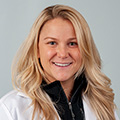Department of Orthopaedic Surgery
Mass General Shoulder Service: Scapula Program
Contact Information
Mass General Shoulder Service
Scapula Program
Mass General
55 Fruit Street
Yawkey Center for Outpatient Care, Suite 3G
Boston, MA 02114
Mass General Waltham
52 Second Avenue
Third floor, Suite 3300
Waltham, MA 02451
Mass General/North Shore Center for Outpatient Care
104 Endicott Street
Danvers, MA 01923
Phone: 617-724-7300
Fax: 617-726-0620
Learn more about our Scapula Program
Overview
The Scapula Program within the Orthopaedic Shoulder Service at Mass General focuses exclusively on the diagnosis and comprehensive surgical care of the scapula bone, also known as the shoulder blade or shoulder girdle. The goal of the program is to provide evidence-based, innovative treatments for both children and adults with abnormalities of the nerves, muscles, and bones around the scapula.
The Scapula Program team’s expertise includes shoulder arthritis, scapular trauma, shoulder dystrophies, and other injuries and conditions affecting the scapular region. We specialize in minimally invasive scapular stabilization procedures, bone reconstruction, muscle tendon transfers, nerve releases, and arthroscopic shoulder repair. The Mass General Scapula Program is the foremost referral center for scapular disorders and is the only clinic of its kind nationally and internationally.
The mission of the Mass General Scapula Program is to provide the highest level of nuanced care for patients with problems around the shoulder girdle through expertise, research, and innovation. Our philosophy of care extends beyond traditional, mechanical diagnoses and provides comprehensive understanding and treatment for functional and neuromuscular disorders. Our orthopedic surgeons collaborate with neurologists, physiatrists, radiologists, pain management specialists, and physical and occupational therapists to deliver the most advanced shoulder care in the world.
What is the scapula?
The scapula bone is more commonly known as the shoulder blade and links the arm to the upper back and the rest of the body. The scapula is a uniquely floating bone, dynamically stabilized and producing motion around the shoulder powered by over 14 different muscles.
Using our arms for anything from writing to heavy lifting first requires a stable scapula. When the scapula moves abnormally because of structural or functional problems with the bones or muscles, our arm’s range of motion, strength, and overall function can be limited or lost.
Shoulder conditions we treat
The Scapula Program within the Orthopedic Shoulder Service of Mass General provides expert treatment for the following medical conditions affecting the shoulders of adults and children:
- Clavicle insufficiency or instability
- Degenerative neuromuscular disorders, including facioscapulohumeral dystrophy (FSHD) or other progressive disorders
- Functional scapular movement disorders and scapular muscle dystonias
- Muscle paralysis and atrophy around the scapula
- Nerve compression and injury of peripheral nerves around the scapula
- Obstetric brachial plexus injuries (OBPI)
- Pectoralis minor syndrome and neurogenic thoracic outlet syndrome
- Scapulothoracic abnormal motion (STAM)/scapular winging
- Scapulothoracic bursitis and snapping scapula syndrome
- Scapular bone loss after oncologic resection
- Sprengel's deformity and other congenital scapular abnormalities
Treatments we offer
Your care team will present you with a range of treatment options based on the diagnosis and cause of your condition. Our shoulder experts have extensive experience in diagnosing and treating all manner of disorders in and around the scapula. We will provide a comprehensive physical examination and will conduct relevant and appropriate testing and imaging, including nerve conduction studies, X-rays, CT, and MRI scans.
Many problems around the scapula can be treated non-operatively with focused scapular retraining through physical therapy. More severe or chronic problems may require surgical intervention. Our patient and family-centered team will provide education and collaborate with you to determine the most appropriate course of treatment.
Some of the scapular surgical treatments we specialize in include:
- Arthroscopic (minimally invasive) pectoralis minor release and brachial plexus release
- Arthroscopic peripheral nerve releases
- Arthroscopic scapulothoracic decompression
- Clavicle lengthening, reconstruction, and stabilizing procedures
- Muscle tendon transfers, including pectoralis major and triple tendon transfers
- Scapula reconstruction for bony insufficiency after oncologic resection
- Scapular resection and realignment for congenital (in-born) deficiencies
- Scapular tethering procedures
- Scapulothoracic fusion
In most cases, scapular conditions may be treated or managed conservatively, and our doctors will work with you to determine if conservative treatment is the best approach. We offer a range of nonsurgical treatments, including:
- A multidisciplinary referral program to pain management specialists, functional movement disorders clinics, and genetic testing programs
- Diagnostic and treatment injections, including biologics
- Peripheral muscle and nerve stimulation
- Custom physical therapy plans targeting the shoulder and upper back
Scapula research
Recent publications:
- Lohre R, Elhassan BT. Outcomes of scapulothoracic fusion in patients with facioscapulohumeral dystrophy: a comparison of allograft versus autograft bone grafting. Journal of Shoulder Elbow Surgery (JSES). 2023.
- Zhang D, Garg R, Elhassan BT. 3D-printing assisted clavicle osteotomy for scapulothoracic abnormal motion: a case report. JSES Reviews, Reports and Techniques. 2023.
- Lohre R, Elhassan BT. Serratus Anterior Dysfunction Examination: Wall Push-up or Shoulder Flexion Resistance Test? JSES International. 2022.
- Hoang V, Meter J, Anthony T, Amesur A, Elhassan BT. Triple tendon transfer of levator scapulae, rhomboid major, and rhomboid minor to reconstruct the paralyzed trapezius. Arthroscopy Techniques. 2022.
- Elhassan BT, Dhang KH, Huynh TM, Harstad C, Best MJ. Outcome of arthroscopic pectoralis minor release and scapulopexy for the management of scapulothoracic abnormal motion. JSES. 2022
- Werthel JD, Wagner ER, Sperling JW, Elhassan BT. Tendon transfer options for trapezius paralysis: a biomechanical study. Journal of American Academy of Orthopaedic Surgeons. 2019.
- Werthel JD, Wagner ER, Elhassan BT. Long-term results of latissimus dorsi transfer for internal rotation contracture of the shoulder in patients with obstetric brachial plexus injury. JSES Open Access. 2018.
Tendon Transfer Surgery
Hear from Bassem Elhassan, MD, and Ryan Lohre, MD, about what tendon transfer surgery is and how patients can benefit from this innovative procedure.
Our scapula team
-
![]()
- Chief, Mass General Brigham Shoulder Service
- Program Director, Shoulder & Elbow Fellowship
- Professor of Orthopedic Surgery, Harvard Medical School
-
![]()
- Orthopaedic Shoulder Surgeon
- Assistant Professor of Orthopaedic Surgery, Harvard Medical School
-
![]()
- Physician Assistant with Dr. Bassem Elhassan
-
![]()
- Nurse Practitioner with Dr. Bassem Elhassan & Dr. Ryan Lohre
Mass General Shoulder Service: Scapula Program
Mass General offers specialized surgical care for the shoulder joint that includes a team focused on conditions and treatment of the scapula (shoulder blade).




